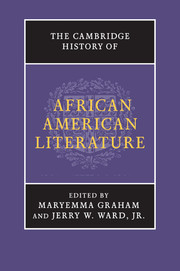Book contents
- Frontmatter
- Introduction
- PART I AFRICAN AMERICAN LITERATURE FROM ITS ORIGINS TO THE TWENTIETH CENTURY
- 1 Sounds of a tradition: the souls of black folk
- 2 Early print literature of Africans in America
- 3 The emergence of an African American literary canon, 1760–1820
- 4 Dividing a nation, uniting a people: African American literature and the abolitionist movement
- 5 African American literature and the abolitionist movement, 1845 to the Civil War
- 6 Writing freedom: race, religion, and revolution, 1820–1840
- 7 “We wish to Plead our own Cause”: independent antebellum African American literature, 1840–1865
- 8 Racial ideologies in theory and practice: political and cultural nationalism, 1865–1910
- 9 The “fictions” of race
- 10 “We Wear the Mask”: the making of a poet
- 11 Toward a modernist poetics
- PART II AFRICAN AMERICAN LITERATURE IN THE TWENTIETH CENTURY
- PART III AFRICAN AMERICAN LITERATURE AS ACADEMIC AND CULTURAL CAPITAL
- Bibliography
- Index
- References
11 - Toward a modernist poetics
from PART I - AFRICAN AMERICAN LITERATURE FROM ITS ORIGINS TO THE TWENTIETH CENTURY
Published online by Cambridge University Press: 28 May 2011
- Frontmatter
- Introduction
- PART I AFRICAN AMERICAN LITERATURE FROM ITS ORIGINS TO THE TWENTIETH CENTURY
- 1 Sounds of a tradition: the souls of black folk
- 2 Early print literature of Africans in America
- 3 The emergence of an African American literary canon, 1760–1820
- 4 Dividing a nation, uniting a people: African American literature and the abolitionist movement
- 5 African American literature and the abolitionist movement, 1845 to the Civil War
- 6 Writing freedom: race, religion, and revolution, 1820–1840
- 7 “We wish to Plead our own Cause”: independent antebellum African American literature, 1840–1865
- 8 Racial ideologies in theory and practice: political and cultural nationalism, 1865–1910
- 9 The “fictions” of race
- 10 “We Wear the Mask”: the making of a poet
- 11 Toward a modernist poetics
- PART II AFRICAN AMERICAN LITERATURE IN THE TWENTIETH CENTURY
- PART III AFRICAN AMERICAN LITERATURE AS ACADEMIC AND CULTURAL CAPITAL
- Bibliography
- Index
- References
Summary
Though sadly understudied, the postbellum, pre-New Negro era of African American poetry, roughly 1865 to the First World War, looms as a pivotal if not defining moment in the larger sweep of African American poetics and culture. Perhaps one of the reasons for this era's neglect is that prominent Harlem Renaissance poets – James Weldon Johnson and Sterling A. Brown in particular – went to considerable lengths to distance themselves and their generation from the previous one and its alleged political and artistic shortcomings. For them, both the dialect and genteel (or romantic) traditions of African American poetry held little promise for their own artistic projects and seemed to wilt under the pressure of deteriorating racial conditions. Yet New Negro poets confronted many of the same dilemmas, and indeed pursued many of the same agendas as their forebears, suggesting a closer relationship – even indebtedness – that was seldom acknowledged. Perhaps it is this deeply conflicted relationship with the postbellum generation that begins to suggest the era's enduring significance.
Acknowledged or not, the postbellum generation created precedents for negotiating American popular culture and its racial politics, for addressing “mainstream” audiences and tastes shaped by popular culture, and for working within received poetic traditions. In a sense, this generation prefigured modernist poetics by confronting the conundrum of simultaneous insider and outsider status. They were the first to market to a mainstream or popular taste, while attempting to address the needs and expectations of blacks at a particularly dire moment in American racial history.
- Type
- Chapter
- Information
- The Cambridge History of African American Literature , pp. 220 - 238Publisher: Cambridge University PressPrint publication year: 2011



